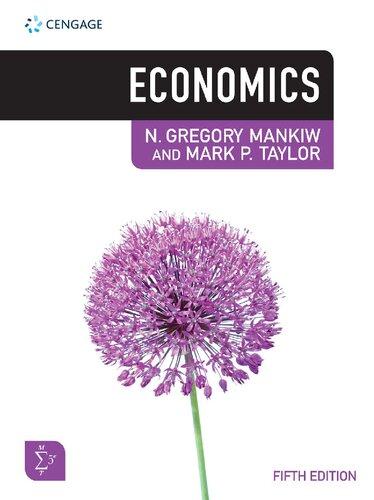When governments levy indirect taxes, they may have to take into account what type of goods are
Question:
When governments levy indirect taxes, they may have to take into account what type of goods are covered by those taxes, what the impact is likely to be on consumers and whether the impact is desirable or not. In February 2018, for example, the South African government announced that value added tax (VAT) was to be increased from 14 per cent to 15 per cent. Increasing VAT has different effects on different groups of people; in particular, the poor may be affected more significantly than the rich in paying higher prices for essential goods and services.
For this reason, some goods are zero rated or have a lower rate of VAT applied to them. Many countries have these different rates. One of the reasons is that some goods might be classed as merit goods as defined in this chapter. A particular example is women’s sanitary products. In South Africa, a report published by Professor Ingrid Woolard, Dean of Stellenbosch University’s Faculty of Economic and Management Sciences, recommended that women’s sanitary products be one of the products which should be zero rated. The reason was that the burden of the tax would hit the poor disproportionately and might result in under-consumption of this important product.
In the UK, there has also been a debate about VAT on sanitary products which has been dubbed the ‘tampon tax’. In the UK, VAT rates on sanitary products have changed five times since 1973, and at the time of writing was 5 per cent compared to the standard rate of VAT at 20 per cent. Critics have argued that even this lower rate is damaging and prevents some people from being able to afford to buy these products. It has been argued that sanitary products should be zero rated.
It has been estimated that if a girl’s periods begin at age 12, then they would spend around £1,500 (€1,700) during their lifetime on sanitary products of which, around £77 (€86) would be on VAT, assuming the tax was levied at 5 per cent.
Part of the debate in the UK has been highlighted as part of the Brexit discussions. If member states wanted to apply a different rate of VAT to some products like sanitary products, they must apply to the EU for permission.
In 2016, a resolution to allow member states to have more flexibility in deciding VAT rates for essential products like sanitary products was unanimously adopted. The resolution included an option for member states to recommend a zero rate on such products.
Critical Thinking Questions
1 Would you agree that women’s sanitary products should be classed as merit goods? Justify your argument.
2 If VAT increased from (say) 14 per cent to 15 per cent, as in South Africa, what other products should governments consider as merit goods which might attract a lower or zero rate of VAT ?
3 Consider the argument that higher rates of VAT on products like sanitary products disproportionately affect the poor. In your answer, reflect on the meaning of the words ‘disproportionately’ and ‘poor’ (these words are emotive!).
4 Look at the estimate of the amount an average woman would spend on sanitary products over their lifetime.
Do the figures surprise you or not? Explain. Do they suggest that levying VAT on sanitary products should be subject to a zero rating?
5 If the EU has passed a resolution giving member states more flexibility in setting VAT rates on goods such as sanitary products, would you expect all member states to have responded by setting zero rates on sanitary products?
Do some research to find out how many member states (include the UK in your research) have adjusted VAT rates. Comment on your findings in the light of the merit goods argument applied to sanitary products
Step by Step Answer:






